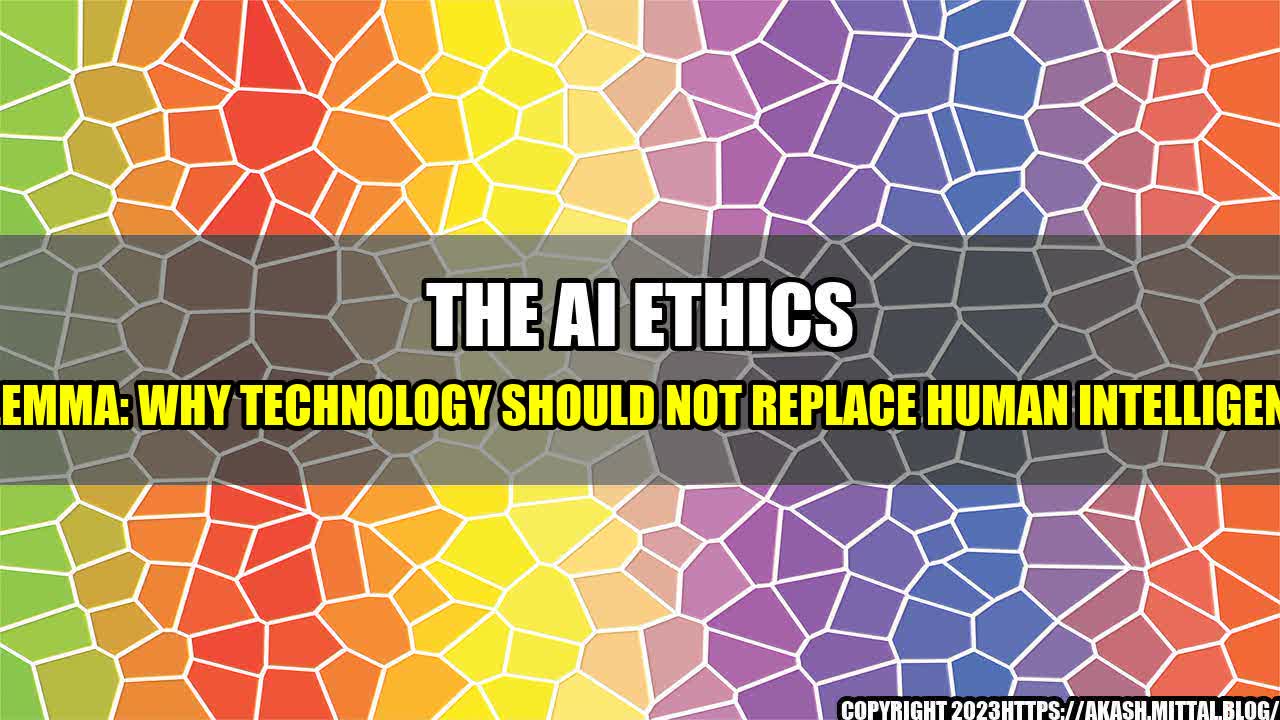The AI Ethics Dilemma: Why Technology Should Not Replace Human Intelligence

Imagine a professor who is very strict when it comes to grading essays of his students. His name is Mr. Smith and he is known for being a perfectionist. One day, he received a message from ChatGPT, a well-known AI algorithm that is capable of writing essays on various topics. The message stated that the professor's students were using the AI tool to write their essays and pass the class. Mr. Smith was shocked and angry. He immediately failed the entire class. Little did he know, the message was false.
Unfortunately, cases like this are becoming more common. Teachers and professors around the world are using AI technology to grade papers and essays, and even to teach courses. While this technology has its benefits, we cannot ignore the ethical implications it carries. In this article, we will explore the AI ethics dilemma and break down why technology should not replace human intelligence in education.
AI in Education
The use of AI in education has been on the rise in recent years. According to the U.S. Department of Education, over 80% of K-12 school districts in the United States are using some form of AI technology to personalize learning for their students. Here are some quantifiable examples of AI in education:
- Chatbots. Schools and universities are using chatbots to provide students with quick answers to their questions, making it easier for them to find the information they need without human intervention.
- Intelligent tutors. AI tutors can individualize instruction based on a student's progress, providing them with personalized feedback and support.
- Automated grading systems. AI is being used to grade essays and assignments, freeing up time for teachers and professors to focus on other aspects of teaching.
While these examples may seem promising, we must consider the ethical implications that come with using AI in education.
The AI Ethics Dilemma
The AI ethics dilemma is a complex issue that revolves around the use of AI technology in situations where human judgment is crucial. In the case of education, the stakes are high. When we use AI to grade essays or assignments, we are essentially replacing human judgment with a machine algorithm.
This can have serious consequences, as AI algorithms can be biased and imperfect. They may not be able to recognize nuances in language or cultural differences that a human could pick up on. Furthermore, they make it easier for students to cheat and to fake their work, which undermines the integrity of the educational system.
While AI technology can help save time and effort for teachers and professors, we must ask ourselves if it is worth the ethical trade-offs. Is it fair to replace human judgment with a machine algorithm? Is it fair to let students use an AI tool to cheat their way through a class?
Why Technology Should Not Replace Human Intelligence
1. AI is not capable of human creativity.
One of the most significant limitations of AI is its inability to be creative and think outside of the box. In education, creativity is critical for students to develop their own ideas and viewpoints. AI cannot do this, as it only follows a set of rules and algorithms that are programmed into it.
2. AI can be fallible.
We all know that AI can make errors. It's not flawless. Imagine if an AI algorithm were to grade your essay and give you a failing grade because it couldn't understand the message you were trying to convey. That wouldn't be fair, would it?
3. Human interaction is necessary.
Education is not just about learning the concepts and ideas. It's also about the interactions and discussions between teachers and students. When we rely too much on AI technology, we lose that human connection that is so crucial for the educational process.
- AI technology is becoming more prevalent in education, but the ethical implications must be considered.
- Replacing human judgment with a machine algorithm can have serious consequences, including bias and undermining the integrity of the educational system.
- Human intelligence and interaction are necessary for the education process and should not be replaced entirely by technology.
Curated by Team Akash.Mittal.Blog
Share on Twitter Share on LinkedIn